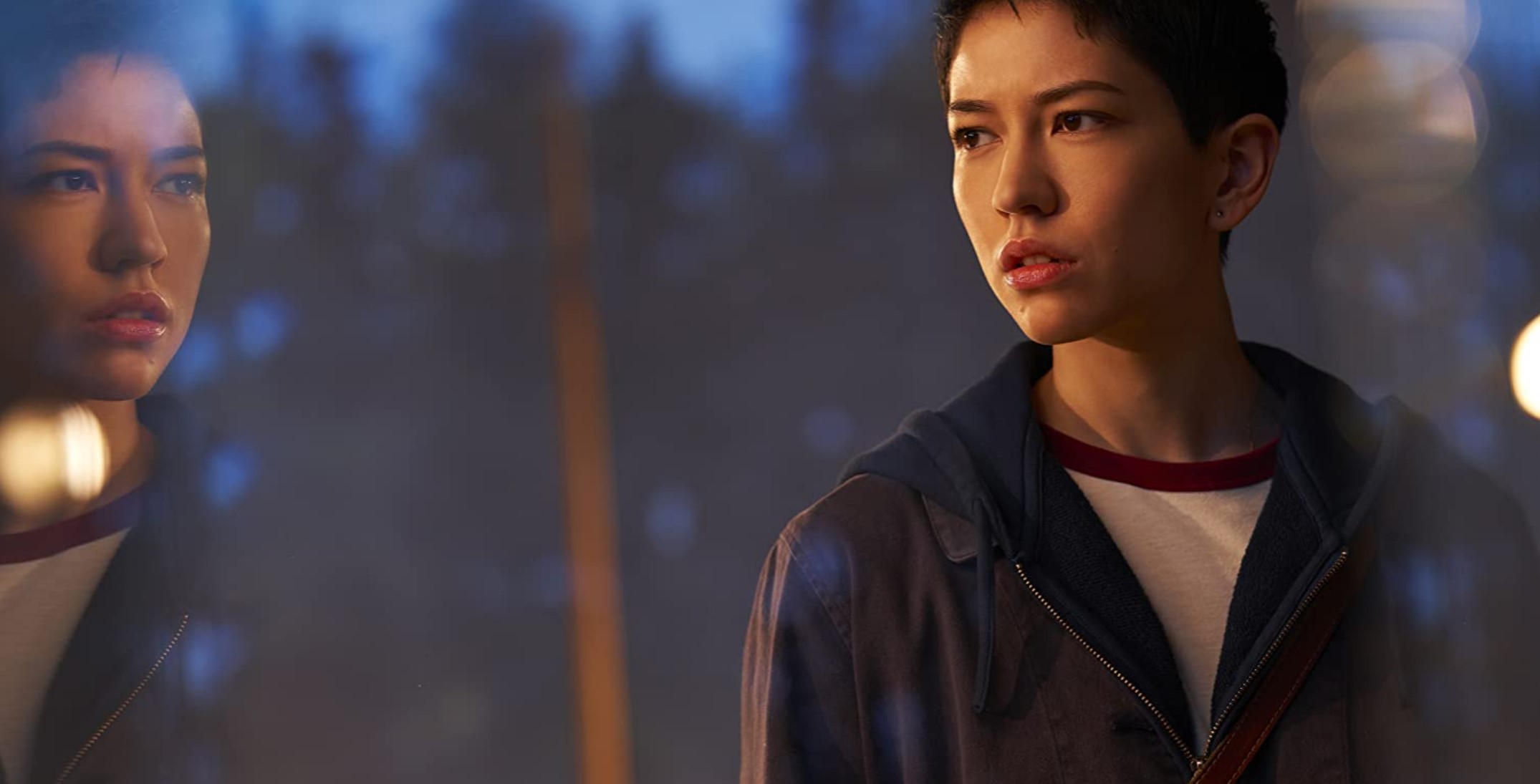Review | TV: ‘Devs’ Stretches its Intrigue Thin
Mad Scientist Noir with Visual Glitz and Shine

Science fiction auteur Alex Garland joins the ranks of directors who have migrated from features to long-form prestige television. Garland’s eight-part miniseries, Devs, is the maiden enterprise in Disney’s new FX on Hulu initiative, where FX programming appears exclusively on the Hulu streaming site without broadcasting on the regular FX channel first, concurrently, or even ever. The premiere of Devs launched with two episodes and has since been followed by the release of a single episode each week.
At the heart of Devs is a mystery, but it’s not the mystery the protagonist thinks it is. Lily (Sonoya Mizuno) works as a security programmer for an awesomely powerful tech conglomerate, Amaya — the kind of tech conglomerate national governments pay deference to and not the other way around. Her boyfriend, Sergei (Karl Glusman), has an aptitude for coding and mapping organism behavior, and he’s offered a promotion to work in Amaya’s top-secret development sector, known as Devs. After one day on the job, Sergei disappears. The company presents it as a suicide to Lily, but the viewer knows what really happened. While she’s trying to figure out what became of Sergei and why, the viewer is engaged in a higher order of intrigue altogether: What on earth is Devs working on?
Devs combines the mad scientist noir elements of Ex Machina, Garland’s directorial debut, with the visual glitz and shine of Annihilation, his big-budget follow up. The Devs compound shimmers and radiates with an otherworldly golden light as electromagnetic currents convey entire rooms while seemingly suspended in space. The scientific understanding of physical properties at Devs is a speculative wonder that draws us into the magic of what their advanced quantum computing has achieved. Meanwhile, outside the compound, the familiar Bay Area environs seem drained of color, with lifeless grays, off-whites, and beiges, like a laboratory cityscape, an urban maze for test-subject mice.
The show shifts back and forth between the two locations, and, unfortunately, the tension starts to sag. We want to be in the pulsing heart of the wonder, but the episodic storytelling keeps leading us out into the drab perimeter. Ex Machina is such a tight film, so strongly cohered to its central mystery that it doesn’t breathe; Annihilation is so loose and expansive, it doesn’t totally gel. Disappointingly, Devs fails to find the balance between these two extremes in Garland’s oeuvre. There is the suggestion of a much tighter feature buried within Devs, as if the plot has been stretched thin with reactions at half-speed and needlessly cryptic conversations just to maintain the mystery over the course of eight episodes. The languid pace condemns Mizuno’s character to a state of indefatigable consternation, tiring the viewer with her untiring exasperation, endlessly at wits’ end.
This is Sonoya Mizuno’s first speaking role in one of Garland’s films. Her contributions before now have been solely physical, as the disco-dancing pleasure-servant in Ex Machina and then as the lithe, mimicking humanoid creature of Annihilation. Her physical presence here has been subdued by an androgynous wardrobe and transmuted into the slouched gawkiness of a Silicon Valley programmer. For nearly the entire season, her character grasps uncertainly toward the mystery surrounding her boyfriend, but, with that mystery already solved for the viewer, her character’s ignorance becomes a drag on the storytelling and her reliably wooden line-delivery does nothing to liven things up.
More fascinatingly situated in the show’s arc is the magician at its center, played by mister rustic himself, Parks and Recreation icon Nick Offerman. As a long-haired Silicon Valley tycoon who stuffs his mouth with microgreens, Offerman may initially appear to be playing against type, but closer inspection shows that his character’s name, Forest, is not exactly ironic. His vision of computing isn’t industrial or even cyber. He is after something wholly organic, and he may have cracked the code.
While Devs is at times overstuffed with filler and suffers from pacing issues, the extended length allows Garland creative liberties that are difficult to imagine him finding space for in the narrow scope of a film. Episode five is a case in point, where Garland is able to devote an entire episode to explicating and illustrating the theory of quantum mechanics that undergirds the speculative foundation of the series. It’s both visually arresting and dramatically compelling and alone is nearly enough to justify the series’ slow burn to get there.
Garland’s films have also become reliable showcases for one of the most dynamic film music duos working today, Ben Salisbury and Geoff Barrow, and Devs is no exception. Salisbury and Barrow know how to play the quiet moments with simple, dreamy, melancholic melodies, usually conjured forth with acoustic instrumentation. But, on the other side of the spectrum, as far apart as galaxies, they can concoct the helter-skelter synthetic cacophonies of sci-fi horror. The score to Devs revs up like a chorus of souls being whipped around and lacerated by the swirling winds of Dante’s second circle of Hell, as EDM bass bombs pound in slow, stomping rhythmic eruptions. Devs is as worthwhile to hear as it is to see.
In this shared moment of behavior modeling and social choreography, all in faithful deference to algorithmic projections, Devs is perhaps the perfect show through which to sublimate and discharge our anxieties in a fiction not totally dissimilar from our reality but with ills and paranoias just removed enough to be comforting. The series might be a bit of a slog at times, but it has plenty of rewards, and most of us have plenty of time on our hands.



